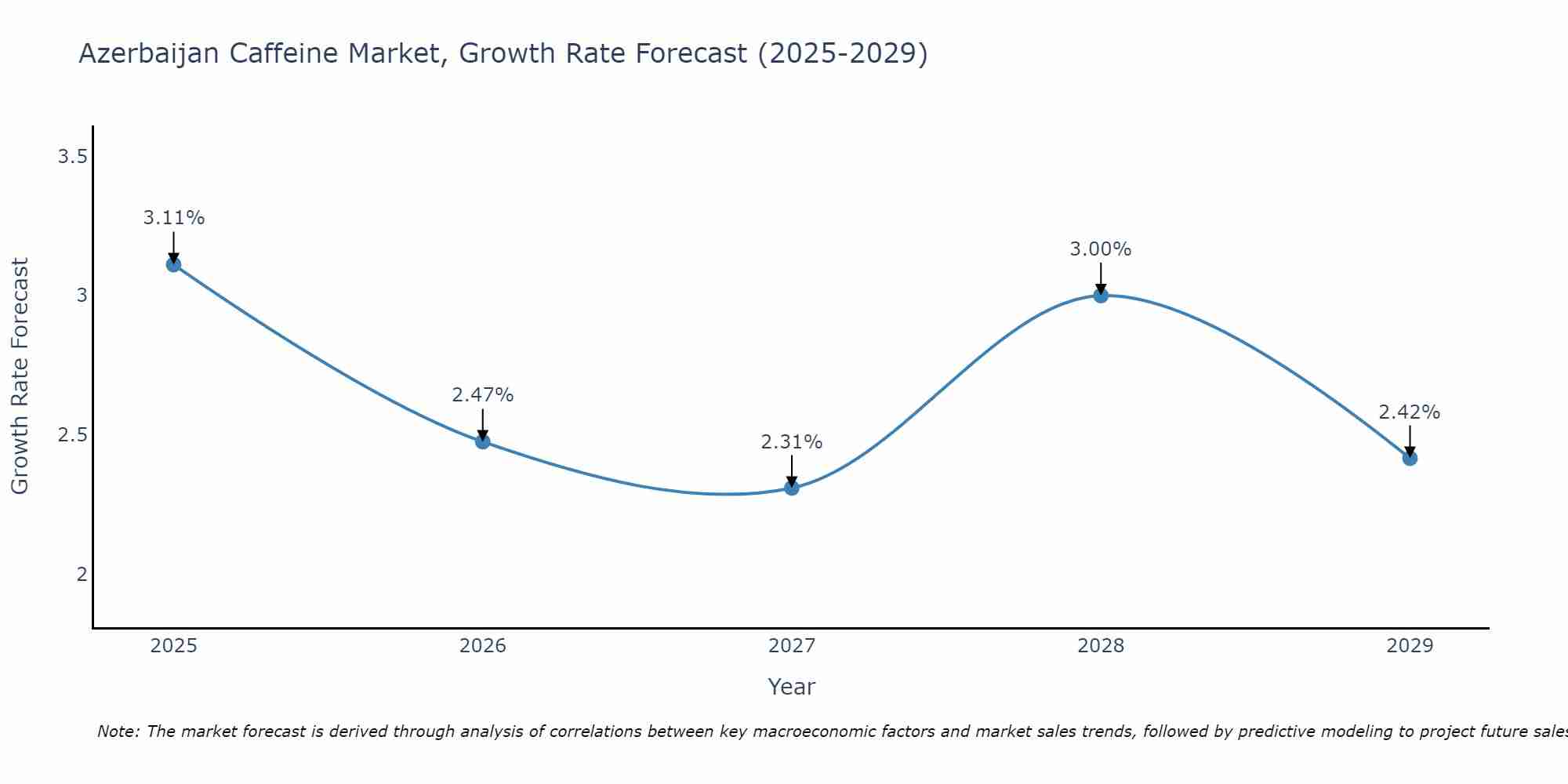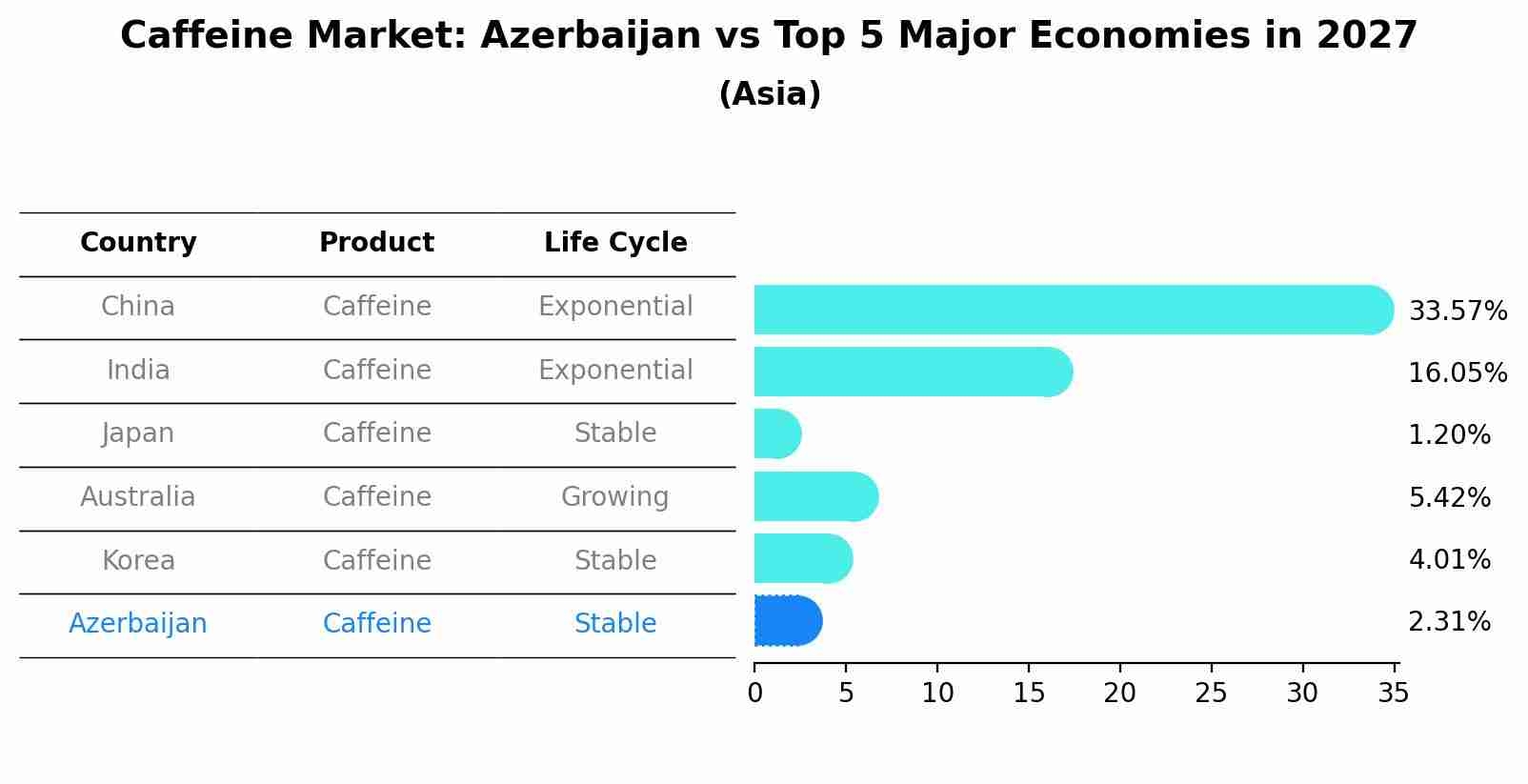Azerbaijan Caffeine Market (2025-2031) Outlook | Trends, Size, Industry, Value, Share, Companies, Forecast, Revenue, Analysis & Growth
| Product Code: ETC110056 | Publication Date: Jun 2021 | Updated Date: Apr 2025 | Product Type: Report | |
| Publisher: 6Wresearch | Author: Ravi Bhandari | No. of Pages: 70 | No. of Figures: 35 | No. of Tables: 5 |
Azerbaijan Caffeine Market Size Growth Rate
The Azerbaijan Caffeine Market is projected to witness mixed growth rate patterns during 2025 to 2029. Starting high at 3.11% in 2025, the market steadily declines to 2.42% by 2029.

Caffeine Market: Azerbaijan vs Top 5 Major Economies in 2027 (Asia)
By 2027, Azerbaijan's Caffeine market is forecasted to achieve a stable growth rate of 2.31%, with China leading the Asia region, followed by India, Japan, Australia and South Korea.

Azerbaijan Caffeine Market Synopsis
In Azerbaijan, the Caffeine market is experiencing growth driven by the country`s growing food and beverage industry and changing consumer preferences towards caffeinated products. Caffeine, a natural stimulant found in coffee, tea, and soft drinks, is widely used as an ingredient in energy drinks, dietary supplements, and functional foods. With increasing urbanization, hectic lifestyles, and demand for convenience products, the demand for caffeine is expected to rise in Azerbaijan, presenting opportunities for manufacturers and suppliers in the market.
Drivers of the market
In Azerbaijan, the Caffeine market is experiencing growth driven by the country`s beverage industry, changing consumer lifestyles, and the popularity of caffeinated products such as coffee, tea, and energy drinks. Caffeine is widely consumed for its stimulant effects, enhancing alertness, and boosting energy levels. The market is propelled by factors such as urbanization, increasing disposable incomes, and the growing café culture in Azerbaijan.
Challenges of the market
Challenges in the Caffeine market of Azerbaijan include regulatory restrictions and health concerns associated with excessive caffeine consumption. Increasing awareness about the potential health risks of caffeine, such as insomnia, anxiety, and heart palpitations, may impact consumer preferences and demand for caffeinated products. Additionally, addressing sustainability issues and ensuring a stable supply of raw materials pose challenges for caffeine producers and suppliers.
Government Policy of the market
Government regulations may address the production, sale, and consumption of caffeine-containing products in Azerbaijan. Policies may include labeling requirements for caffeinated beverages, restrictions on advertising to minors, and safety assessments to mitigate health risks associated with excessive caffeine consumption.In summary, government policies in Azerbaijan play a significant role in shaping the regulatory environment, market dynamics, and industry standards across various sectors, including manufacturing, food and beverage, chemicals, defense, and telecommunications. These policies aim to ensure safety, promote innovation, and support economic development while protecting public health and the environment.
Key Highlights of the Report:
- Azerbaijan Caffeine Market Outlook
- Market Size of Azerbaijan Caffeine Market, 2024
- Forecast of Azerbaijan Caffeine Market, 2031
- Historical Data and Forecast of Azerbaijan Caffeine Revenues & Volume for the Period 2021-2031
- Azerbaijan Caffeine Market Trend Evolution
- Azerbaijan Caffeine Market Drivers and Challenges
- Azerbaijan Caffeine Price Trends
- Azerbaijan Caffeine Porter's Five Forces
- Azerbaijan Caffeine Industry Life Cycle
- Historical Data and Forecast of Azerbaijan Caffeine Market Revenues & Volume By Type for the Period 2021-2031
- Historical Data and Forecast of Azerbaijan Caffeine Market Revenues & Volume By Natural Caffeine for the Period 2021-2031
- Historical Data and Forecast of Azerbaijan Caffeine Market Revenues & Volume By Synthetic Caffeine for the Period 2021-2031
- Historical Data and Forecast of Azerbaijan Caffeine Market Revenues & Volume By Applications for the Period 2021-2031
- Historical Data and Forecast of Azerbaijan Caffeine Market Revenues & Volume By Pharmaceuticals for the Period 2021-2031
- Historical Data and Forecast of Azerbaijan Caffeine Market Revenues & Volume By Food for the Period 2021-2031
- Historical Data and Forecast of Azerbaijan Caffeine Market Revenues & Volume By Beverages for the Period 2021-2031
- Historical Data and Forecast of Azerbaijan Caffeine Market Revenues & Volume By Flavours and Fragrances for the Period 2021-2031
- Azerbaijan Caffeine Import Export Trade Statistics
- Market Opportunity Assessment By Type
- Market Opportunity Assessment By Applications
- Azerbaijan Caffeine Top Companies Market Share
- Azerbaijan Caffeine Competitive Benchmarking By Technical and Operational Parameters
- Azerbaijan Caffeine Company Profiles
- Azerbaijan Caffeine Key Strategic Recommendations
Frequently Asked Questions About the Market Study (FAQs):
Export potential assessment - trade Analytics for 2030
Export potential enables firms to identify high-growth global markets with greater confidence by combining advanced trade intelligence with a structured quantitative methodology. The framework analyzes emerging demand trends and country-level import patterns while integrating macroeconomic and trade datasets such as GDP and population forecasts, bilateral import–export flows, tariff structures, elasticity differentials between developed and developing economies, geographic distance, and import demand projections. Using weighted trade values from 2020–2024 as the base period to project country-to-country export potential for 2030, these inputs are operationalized through calculated drivers such as gravity model parameters, tariff impact factors, and projected GDP per-capita growth. Through an analysis of hidden potentials, demand hotspots, and market conditions that are most favorable to success, this method enables firms to focus on target countries, maximize returns, and global expansion with data, backed by accuracy.
By factoring in the projected importer demand gap that is currently unmet and could be potential opportunity, it identifies the potential for the Exporter (Country) among 190 countries, against the general trade analysis, which identifies the biggest importer or exporter.
To discover high-growth global markets and optimize your business strategy:
Click Here- Single User License$ 1,995
- Department License$ 2,400
- Site License$ 3,120
- Global License$ 3,795
Search
Thought Leadership and Analyst Meet
Our Clients
Related Reports
- India Switchgear Market Outlook (2026 - 2032) | Size, Share, Trends, Growth, Revenue, Forecast, Analysis, Value, Outlook
- Pakistan Contraceptive Implants Market (2025-2031) | Demand, Growth, Size, Share, Industry, Pricing Analysis, Competitive, Strategic Insights, Strategy, Consumer Insights, Analysis, Investment Trends, Opportunities, Revenue, Segments, Value, Segmentation, Supply, Forecast, Restraints, Outlook, Competition, Drivers, Trends, Companies, Challenges
- Sri Lanka Packaging Market (2026-2032) | Outlook, Competition, Drivers, Trends, Demand, Pricing Analysis, Competitive, Strategic Insights, Companies, Challenges, Strategy, Consumer Insights, Analysis, Investment Trends, Opportunities, Growth, Size, Share, Industry, Revenue, Segments, Value, Segmentation, Supply, Forecast, Restraints
- India Kids Watches Market (2026-2032) | Strategy, Consumer Insights, Analysis, Investment Trends, Opportunities, Growth, Size, Share, Industry, Revenue, Segments, Value, Segmentation, Supply, Forecast, Restraints, Outlook, Competition, Drivers, Trends, Demand, Pricing Analysis, Competitive, Strategic Insights, Companies, Challenges
- Saudi Arabia Core Assurance Service Market (2025-2031) | Strategy, Consumer Insights, Analysis, Investment Trends, Opportunities, Growth, Size, Share, Industry, Revenue, Segments, Value, Segmentation, Supply, Forecast, Restraints, Outlook, Competition, Drivers, Trends, Demand, Pricing Analysis, Competitive, Strategic Insights, Companies, Challenges
- Romania Uninterruptible Power Supply (UPS) Market (2026-2032) | Industry, Analysis, Revenue, Size, Forecast, Outlook, Value, Trends, Share, Growth & Companies
- Saudi Arabia Car Window Tinting Film, Paint Protection Film (PPF), and Ceramic Coating Market (2025-2031) | Strategy, Consumer Insights, Analysis, Investment Trends, Opportunities, Growth, Size, Share, Industry, Revenue, Segments, Value, Segmentation, Supply, Forecast, Restraints, Outlook, Competition, Drivers, Trends, Demand, Pricing Analysis, Competitive, Strategic Insights, Companies, Challenges
- South Africa Stationery Market (2025-2031) | Share, Size, Industry, Value, Growth, Revenue, Analysis, Trends, Segmentation & Outlook
- Afghanistan Rocking Chairs And Adirondack Chairs Market (2026-2032) | Size & Revenue, Competitive Landscape, Share, Segmentation, Industry, Value, Outlook, Analysis, Trends, Growth, Forecast, Companies
- Afghanistan Apparel Market (2026-2032) | Growth, Outlook, Industry, Segmentation, Forecast, Size, Companies, Trends, Value, Share, Analysis & Revenue
Industry Events and Analyst Meet
Whitepaper
- Middle East & Africa Commercial Security Market Click here to view more.
- Middle East & Africa Fire Safety Systems & Equipment Market Click here to view more.
- GCC Drone Market Click here to view more.
- Middle East Lighting Fixture Market Click here to view more.
- GCC Physical & Perimeter Security Market Click here to view more.
6WResearch In News
- Doha a strategic location for EV manufacturing hub: IPA Qatar
- Demand for luxury TVs surging in the GCC, says Samsung
- Empowering Growth: The Thriving Journey of Bangladesh’s Cable Industry
- Demand for luxury TVs surging in the GCC, says Samsung
- Video call with a traditional healer? Once unthinkable, it’s now common in South Africa
- Intelligent Buildings To Smooth GCC’s Path To Net Zero


















